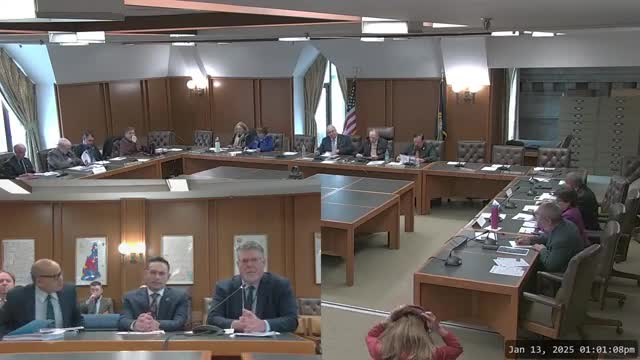Public Utilities Commission describes independent role, adjudicative process and relationship to DOE
Get AI-powered insights, summaries, and transcripts
Subscribe
Summary
PUC Chair Dan Goldner and commissioners briefed the committee on the commission’s role as regulator of investor-owned utilities, its separation from the Department of Energy in 2021, adjudicative and non-adjudicative procedures, settlement review, and the commission’s limited enforcement and investigatory functions.
Dan Goldner, chair of the New Hampshire Public Utilities Commission, told legislators the PUC’s principal mission is to regulate monopolies in the public interest — reviewing utility rates and protecting consumers from excessive charges. "Monopolies don't have competition. They can exploit their market power by charging excessively high prices," Goldner said as he described the PUC’s responsibility to keep rates just and reasonable.
Goldner recapped changes introduced by the 2021 legislative reorganization that moved the executive-branch energy policy staff into a separate Department of Energy and left the PUC as an independent adjudicator. Administrative support for the PUC is now provided by DOE as an attached agency, Goldner said, but the PUC retained independent decision-making authority: staff do not both negotiate and decide contested dockets within the same organization.
Commissioner Janice D’Alfano (attorney commissioner) and Commissioner Arup Chaudhuri (economist) walked members through the PUC’s two primary processes. Adjudicative dockets — formal, trial-like hearings — include rate cases, certificate proceedings and contested financing approvals. Non-adjudicative matters include plan reviews, community-aggregation filings, many investigations and rulemakings.
Goldner emphasized settlements receive careful commission review: unlike a private contract, a settlement filed at the PUC becomes stipulated findings and conclusions that the commission must vet to ensure they serve the public interest. The PUC also conducts investigations and can reopen prior orders where changed circumstances require reexamination.
Commissioners reviewed the PUC’s limited enforcement role since the 2021 reorganization: some audit and enforcement functions moved administratively to DOE, while the PUC retains authority to adjudicate consumer complaints, order reparations and impose penalties when warranted.
Members asked about proceedings that affect default service procurement, laddering and retail competition; commissioners described recent docket activity that directed greater utility self-procurement in default service solicitations and explained how retail competition, community power programs and default service procurement interact with wholesale-market outcomes.
